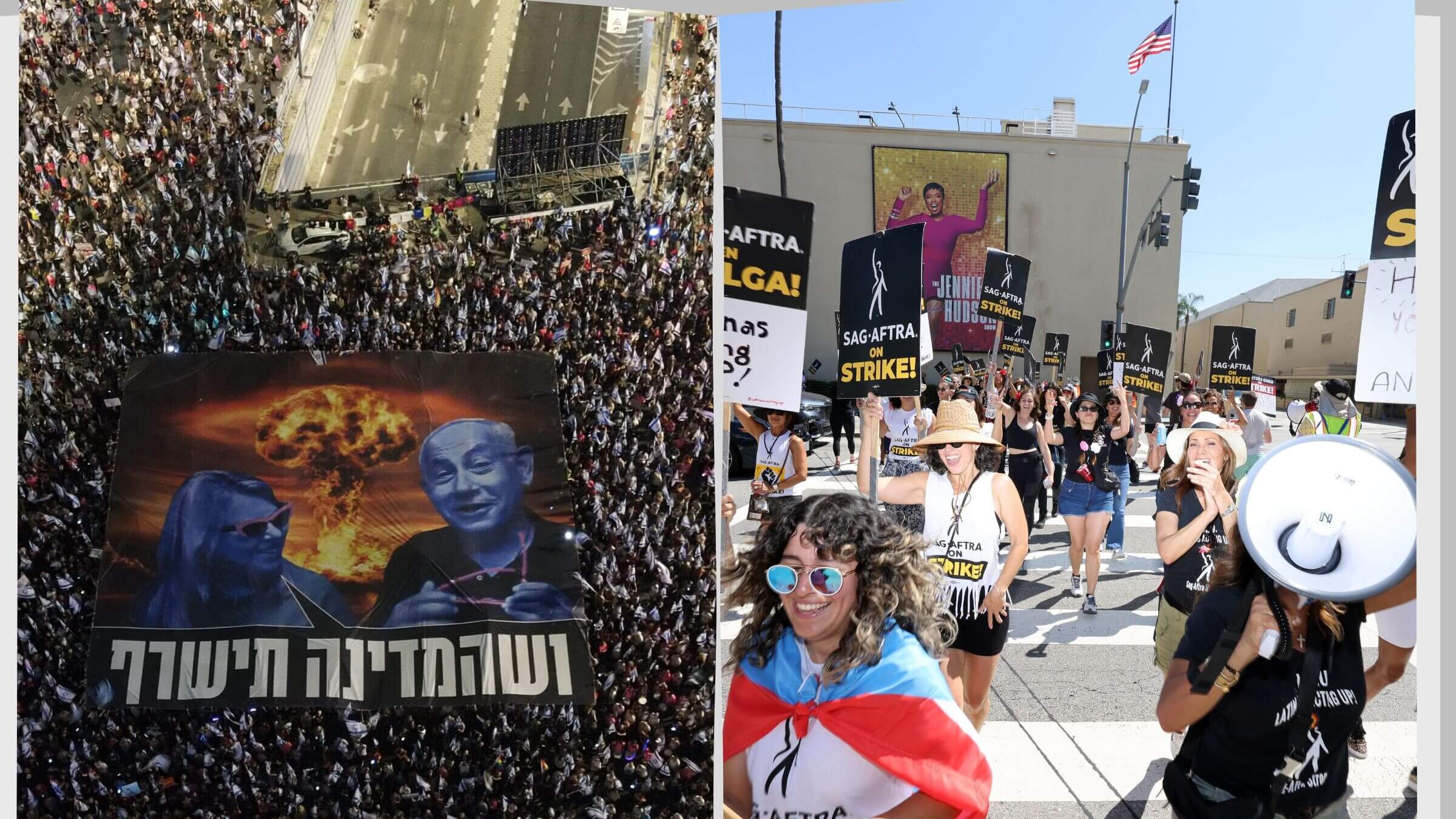What the actors strike can learn from Israeli protest movement
Poor treatment starts to feel normal, and it takes a paradigm shift to stand up for one’s rights — in Hollywood and Israel

L: Aerial picture of Israelis in mass protest against the judicial overhaul, Tel Aviv, Israel. R: SAG-AFTRA members striking outside of Warner Bros. Studios, Burbank, California. Graphic by Nora Berman; Getty Images
I have been picketing with fellow members of SAG-AFTRA labor union, and our brothers and sisters in the Writers Guild of America, as we march in protest of a system that undervalues and mistreats us.
Day in, day out, we stand together in solidarity. As we strike, my heart is also 7,500 miles away with another, larger group of protesters. For nearly eight months, hundreds of thousands of Israelis have amassed to challenge the anti-democratic assault of Benjamin Netanyahu’s government on his country’s legal institutions.
The actors and writers in the United States face issues that we deem existential to our employment; Israelis face a threat to their existence as citizens of a democracy. And we on the picket lines in America can take a few lessons from the resolve and tenacity of those protesting in the streets of Israel.
United by a common goal
Effective protests require large numbers. They call for perseverance and single-mindedness, for creativity and vitality. Israeli pro-democracy demonstrators come from very different backgrounds, but are united in their focus: preserving their democracy.
Every week, they generate new ideas: protesting at unexpected gathering sites, refusing to appear for voluntary military service, creating clever picket signs and hyperactive social media campaigns. They find ways to create a sense of solidarity among protestors, forging commitment and dedication.
I feel this dynamic on the picket lines in Los Angeles. Walking together for hours, we trade stories about life in our industry in our different creative capacities — writers, actors, extras, stunt performers — and though our specific grievances may differ, we feel energized by the common ground we find. Together we pour our vigor into creative, dynamic ways of making our message heard.
For too long, working actors and writers have been treated as if we are lucky to be employed, as if our contributions are somehow less than creation of the very product that enriches the studios. Over time poor treatment starts to feel normal, and it takes a paradigm shift to stand up for one’s rights.
So too in Israel. For decades, Israeli liberals were fairly perceived as being compliant — accepting the weaknesses and failures of their politicians — concentrating, as Americans tend to do, more on their personal lives than on public affairs. But Netanyahu has woken a sleeping beast.
A critical mass of protesters
For over 30 weeks now, masses of patriotic Israelis have assembled in rain and blazing sun, holding vociferous vigils outside the homes of Knesset Members, shutting down segments of the economy, and organizing campaigns of civil disobedience. Some are devoting almost all of their time to the protests, putting work and family on hold.
In July, tens of thousands walked nearly 40 miles from Tel Aviv to Jerusalem in scorching heat. They marched for four days, gathering by the Knesset as it passed a bill to deny the Supreme Court’s authority to challenge unreasonable measures by the executive branch.
The Israeli government is poised to erode its system of checks and balances further, under the rubric of “legal reform.” But the protest movement has had a palpable effect on the government’s destructive campaign. Over the past few weeks, even members of Netanyahu’s own Likud party, keenly aware of their hemorrhaging public support, have demanded that Netanyahu stop or at least slow down the “reform.” But the fight is not over; it continues to escalate.
Last month, on a Saturday night, the total number of Israeli protesters in the streets was estimated at 600,000. That is the population-adjusted equivalent of over 19 million Americans showing up. During the Women’s Marches in January 2017 — one of America’s largest protests ever — only between 3.3 and 4.6 million people nationwide participated. Would four times as many Americans show up for any other cause? It seems unlikely.
We must act now
Neither gun proliferation and the resultant spike in mass shooting attacks — we average more than one a day — nor the Supreme Court’s denial of American women’s reproductive rights, has fueled enough anger to motivate that kind of turnout in the U.S. How about a potential second term from a quadruple-indicted former president whose record on democracy includes the closest charge to treason allowed under U.S. law during peacetime?
We’ve currently got a Republican Party that overwhelmingly supports this man as its candidate. What will we do if Trump returns to the Oval Office with a vengeance, and threatens our democratic institutions and our liberties, as Netanyahu currently threatens Israel’s?
Like my compatriots on the picket lines in Los Angeles, Americans would be wise to look to the example of the millions of Israelis who have bridged differences to band together for a common cause. And it should encourage us to see that although the current protest movement’s agenda is concerned chiefly with Israeli democracy, it has also given space to other activists — those fighting the unsustainable disgrace of the ongoing occupation of millions of Palestinians in the West Bank and Gaza Strip.
The goal of a two-state solution may seem extremely unlikely today. But when you see thousands of Israelis chanting “There is no democracy with occupation” in downtown Tel Aviv and Jerusalem, it does not seem impossible.
Our own struggles for economic fairness for actors and writers will require more time and many more protests. So too will the fight to repair American democracy after the damage done to it by the Trump administration. Let’s look to the east for inspiration, and say together — as is customary in synagogue when we finish reading each book of the Torah — “Chazak, chazak, v’nitchazek.” Be strong, hold fast, and let us strengthen one another.
To contact the author, email [email protected].
















